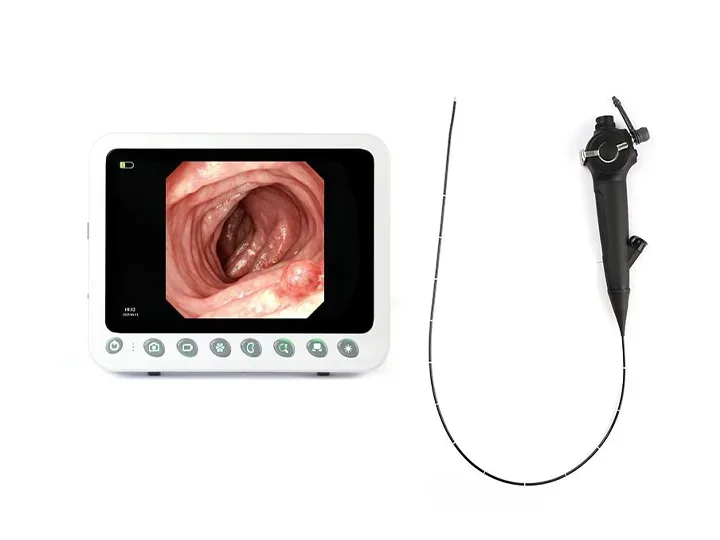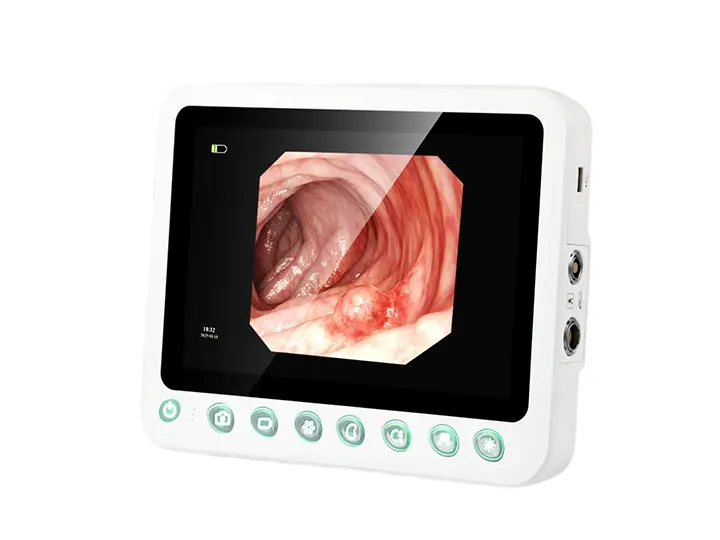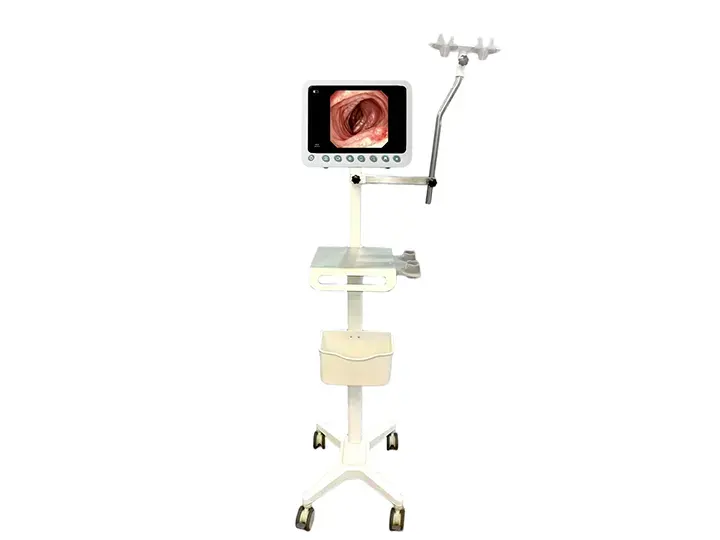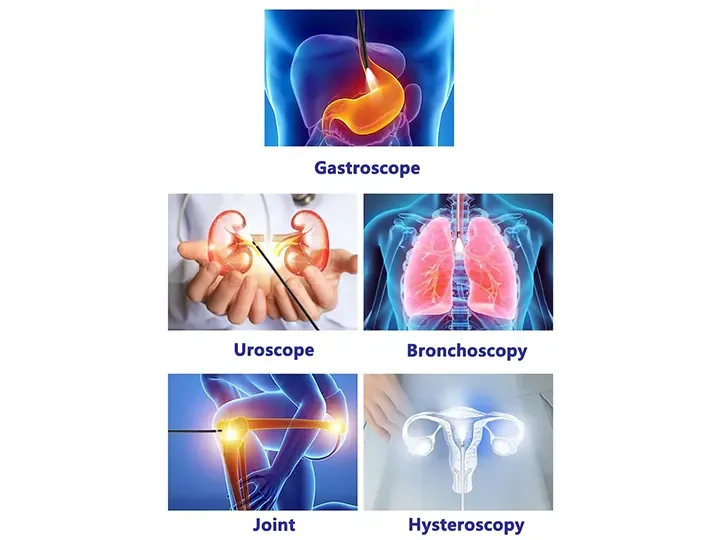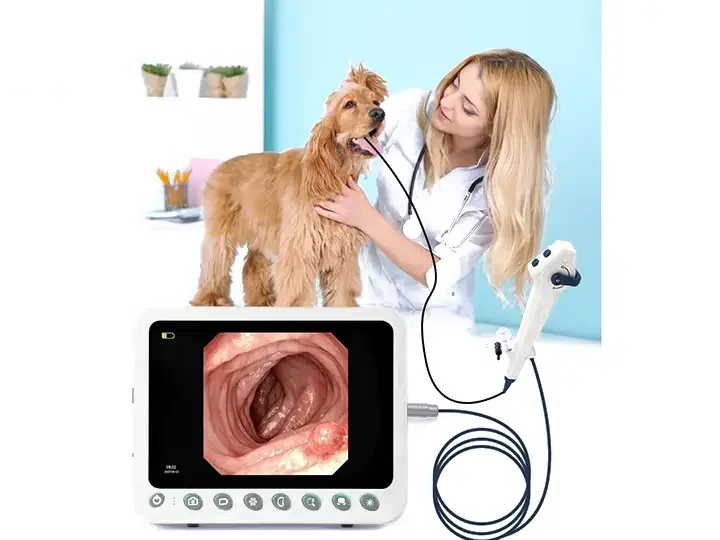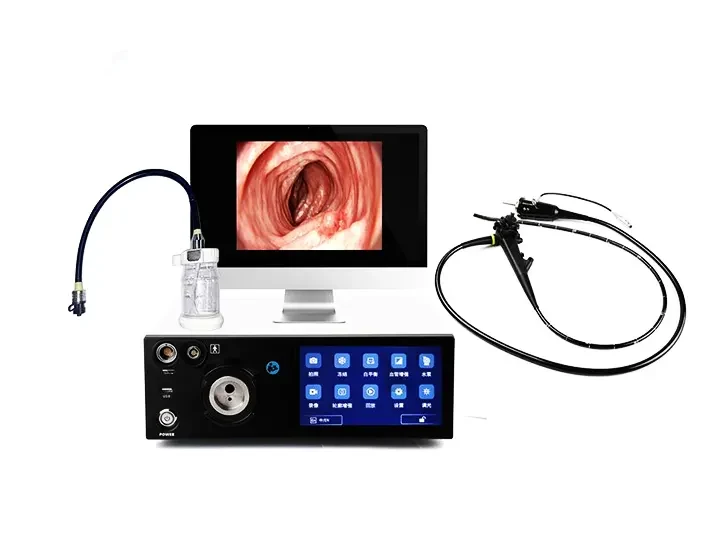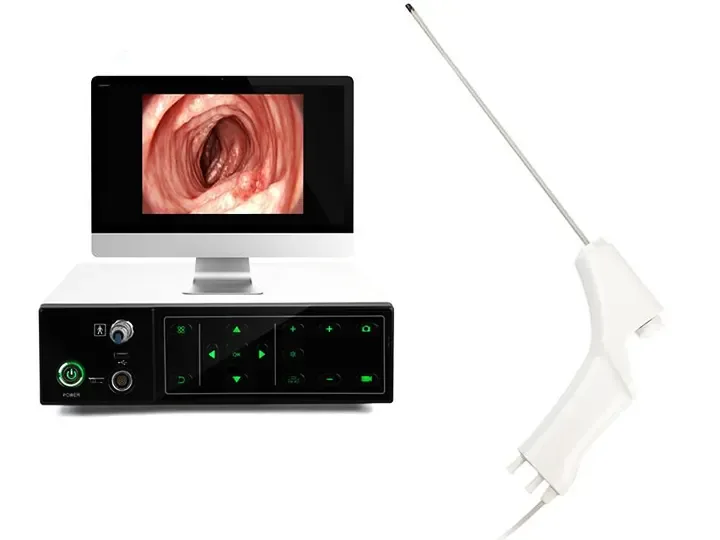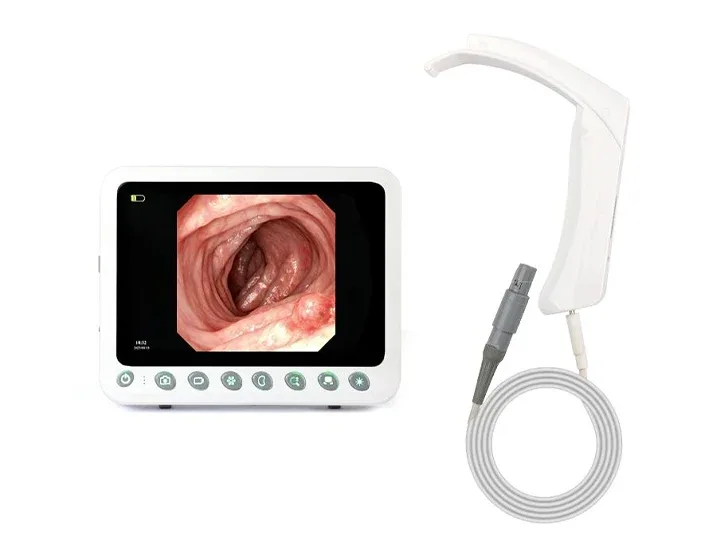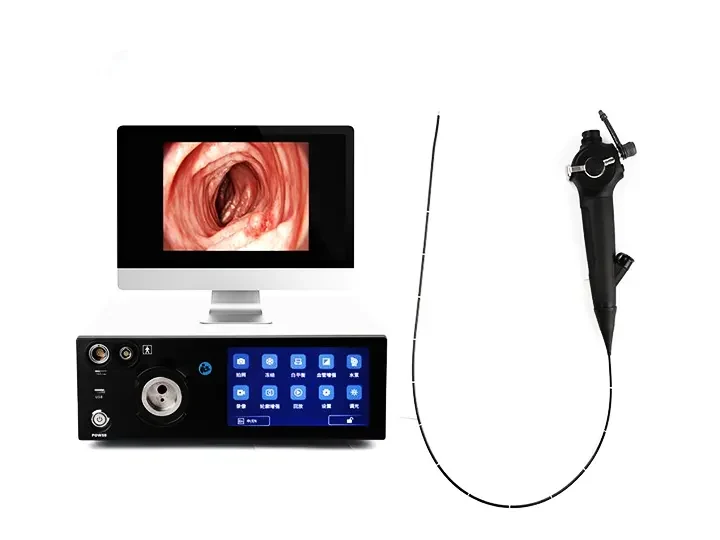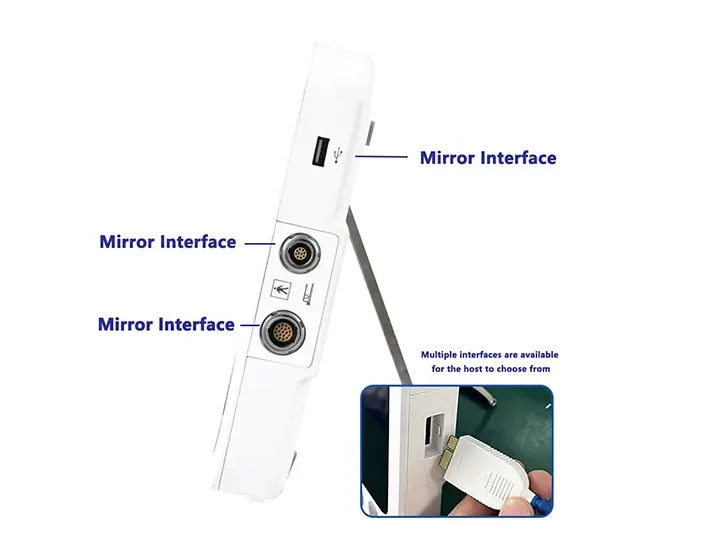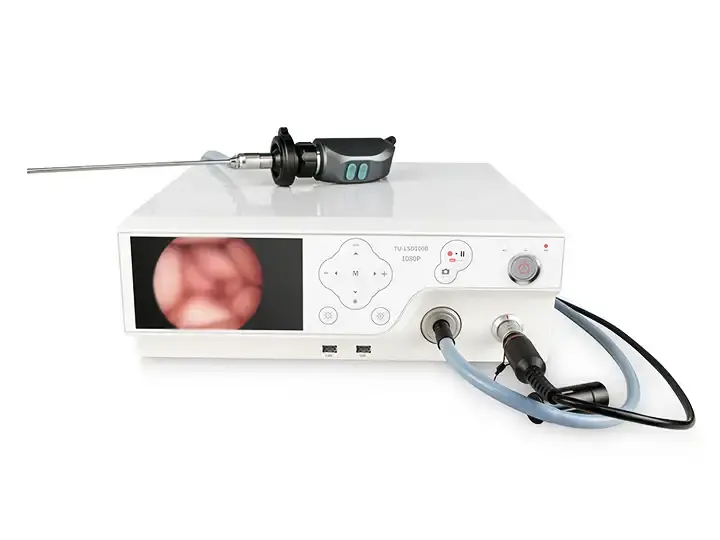What is medical ENT endoscope equipment?
Medical ENT endoscope equipment is a specialized diagnostic and surgical tool designed for otolaryngology and head and neck procedures. It combines 4K ultra-high-definition imaging, minimally invasive access, and multifunctional treatment modules, enabling physicians to examine and treat ear, nose, and throat conditions with greater precision and safety.
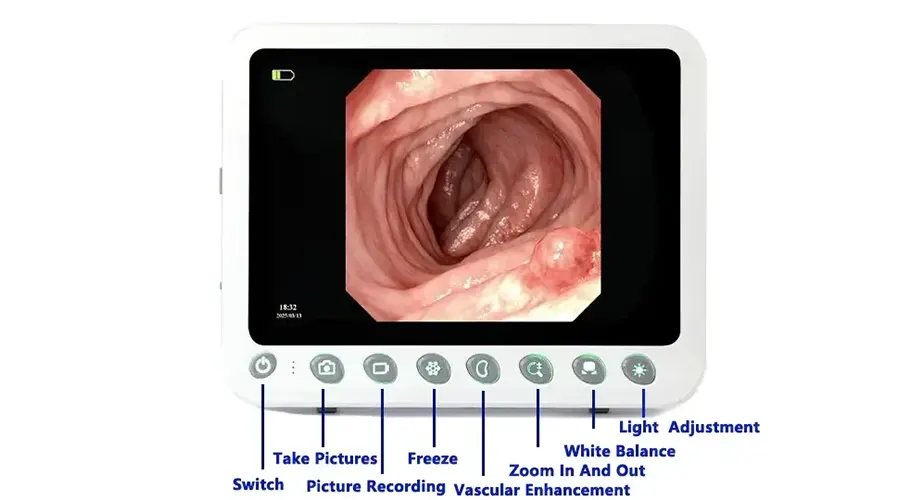
Key Features and System Composition
Optical System
4K UHD resolution (≥3840×2160) for crystal-clear visualization
3D stereoscopic vision with binocular optics
Narrow-band imaging (415nm/540nm) to enhance mucosal structures
Scope Types
Sinus endoscope
Electronic laryngoscope
Otoscope
Multipurpose ENT endoscopes
Functional Modules
Working channels (1.2–3mm) for instruments
Dual irrigation and suction system
Electric cutter (500–15,000 rpm)
Auxiliary Equipment
Electromagnetic navigation (0.8mm accuracy)
CO₂ laser (10.6μm wavelength)
Low-temperature plasma system (40–70℃)
Wide Compatibility and Imaging Functions
Our ENT endoscope system integrates seamlessly with multiple clinical devices:
Scope Compatibility – Supports ureteroscope, bronchoscope, hysteroscope, arthroscope, cystoscope, laryngoscope, and choledochoscope.
Imaging Functions – Capture and freeze frames, zoom in/out, adjust image settings.
Recording & Display – One-touch REC, brightness adjustment with 5 levels, white balance (WB).
Multi-Interface Design – Connects effortlessly with monitors, recorders, and hospital systems.
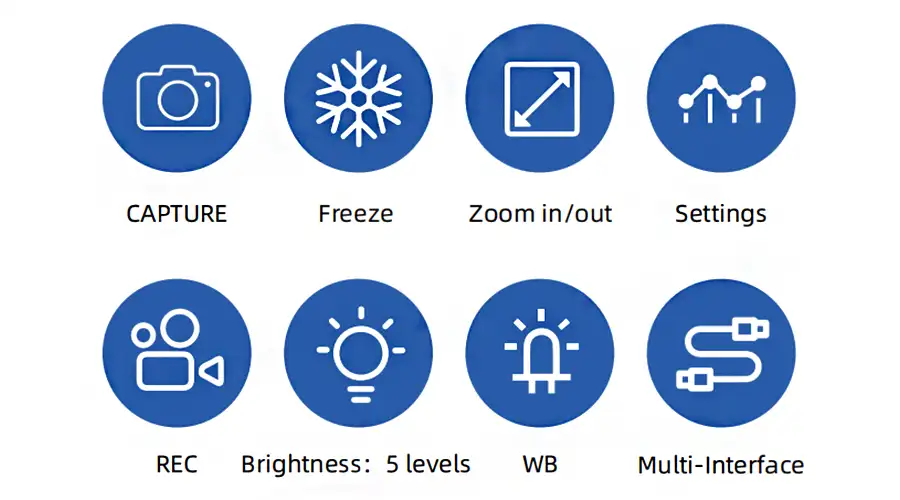
Wide Compatibility
Our endoscope system offers wide compatibility, supporting various scopes such as ureteroscope, bronchoscope, hysteroscope, arthroscope, cystoscope, laryngoscope, and choledochoscope. It is designed with practical imaging functions, including capture and freeze, zoom in/out, customizable image settings, video recording, and five adjustable brightness levels. The device also provides white balance (WB) adjustment and a multi-interface design to ensure flexible connectivity in different clinical environments.
1280×800 Resolution Image Clarity
10.1" Medical Display,Resolution 1280×800,
Brightness 400+,High-definition
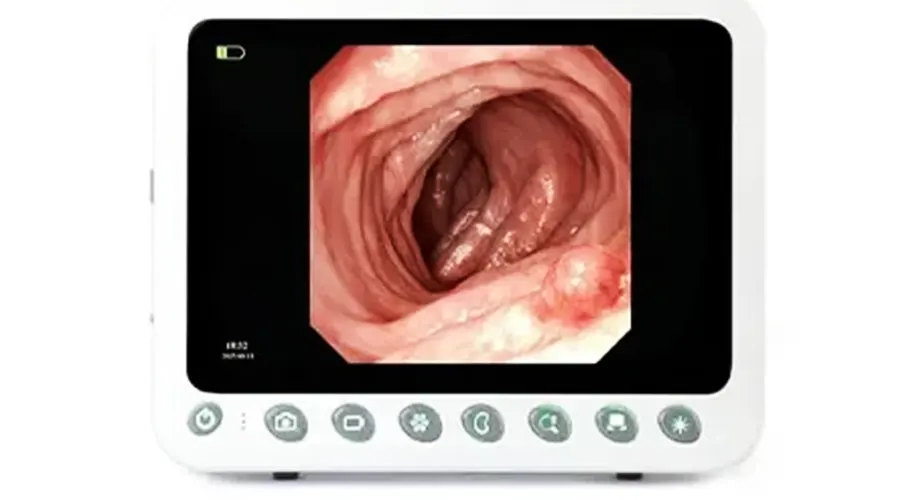
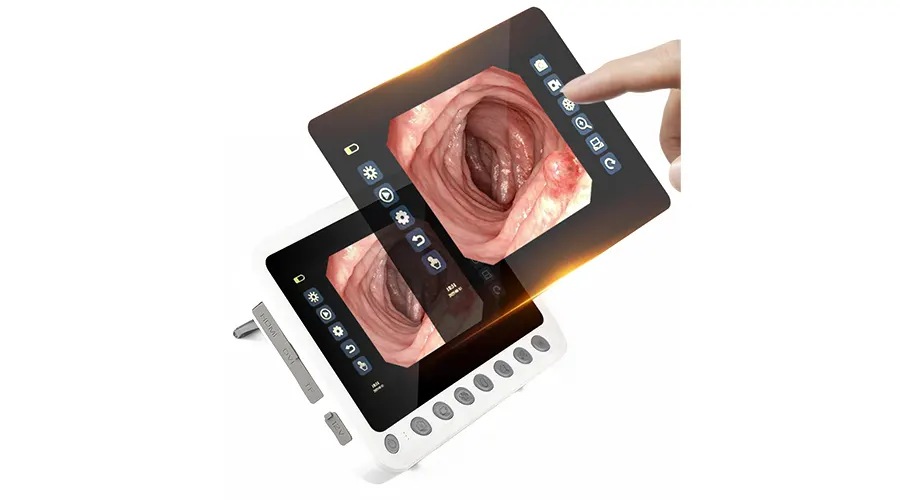
High-definition Touchscreen Physical Buttons
Ultra-responsive touch control
Comfortable viewing experience
Clear Visualization For Confident Diagnosis
HD digital signal with structural enhancement
and color enhancement
Multi-layer image processing ensures every detail is visible
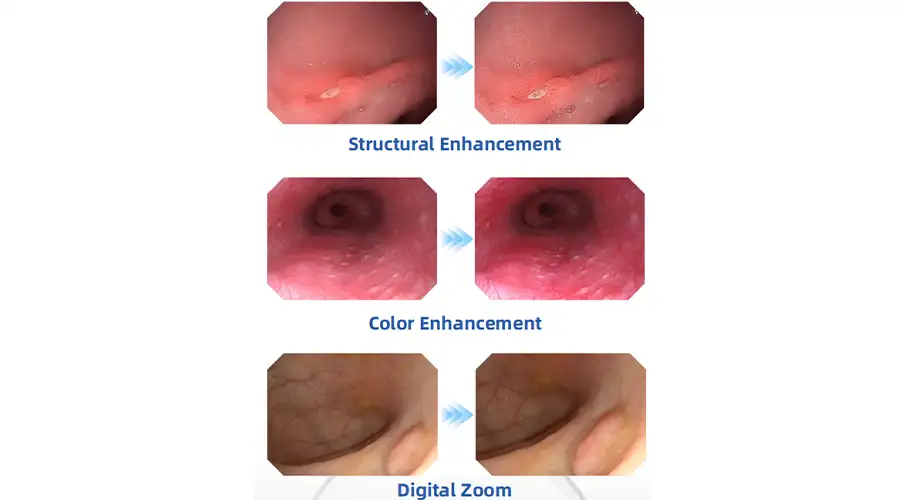
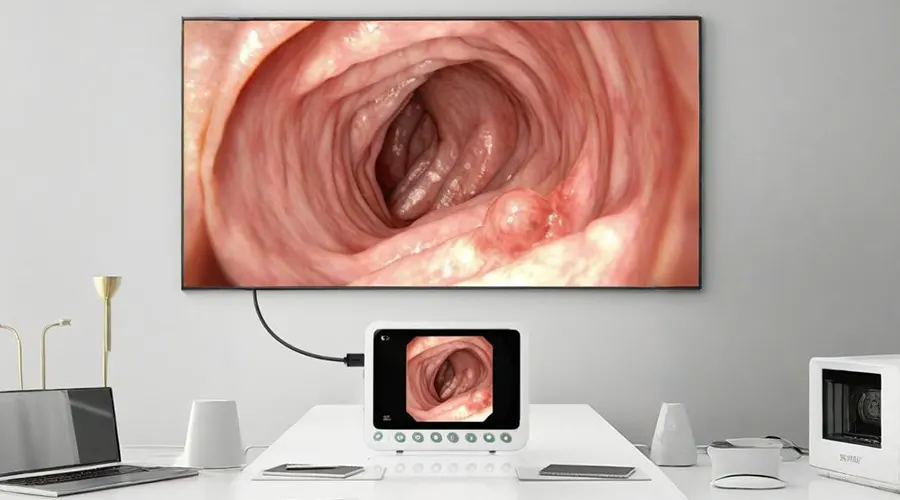
Dual-screen Display For Clearer Details
Connect via DVI/HDMI to external monitors - Synchronized
display between 10.1" screen and large monitor
Adjustable Tilt Mechanism
Slim and lightweight for flexible angle adjustment,
Adapts to various working postures (standing/sitting).
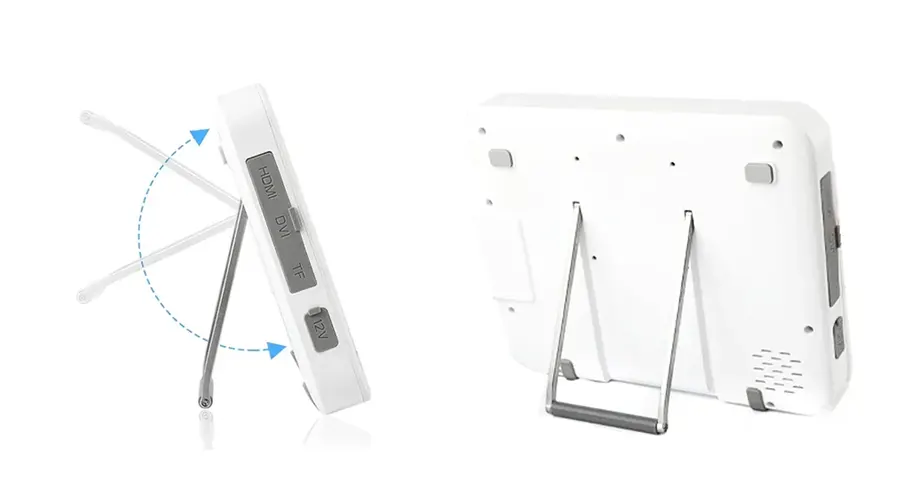
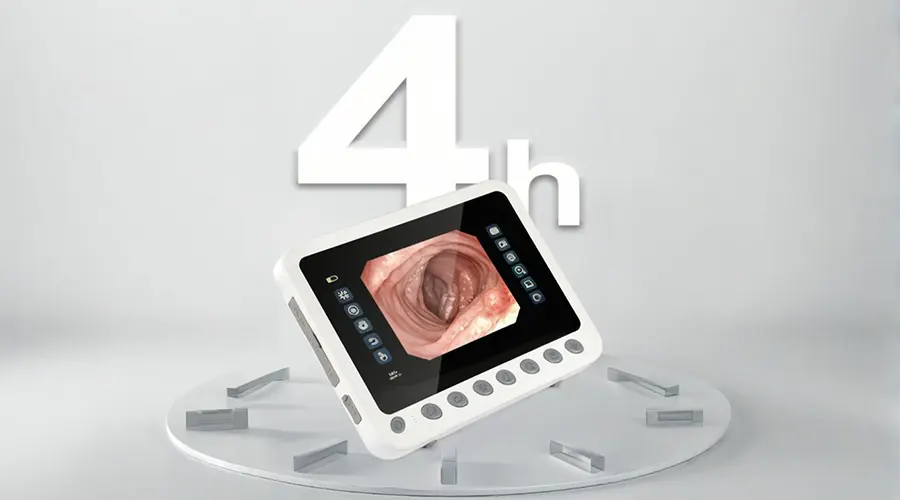
Extended Operation Time
Built-in 9000mAh battery,4+ hours continuous operation
Portable Solution
Ideal for POC and ICU examinations - Provides
doctors with convenient and clear visualization
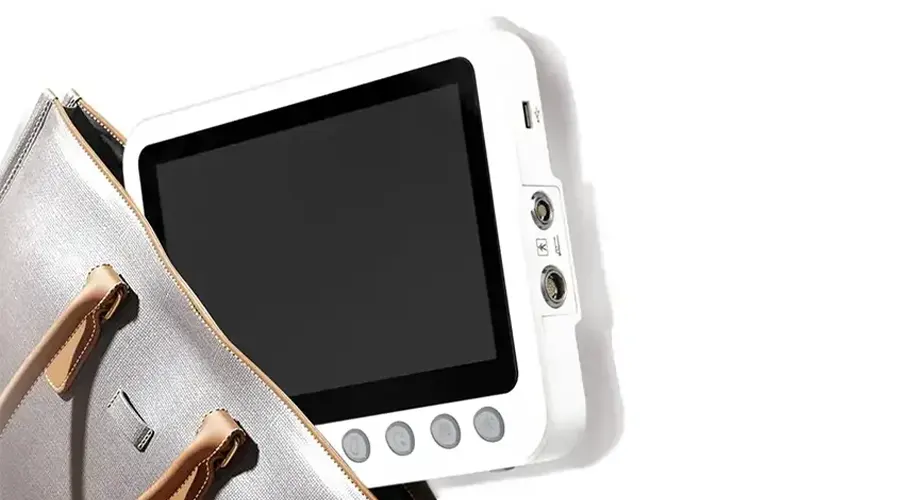
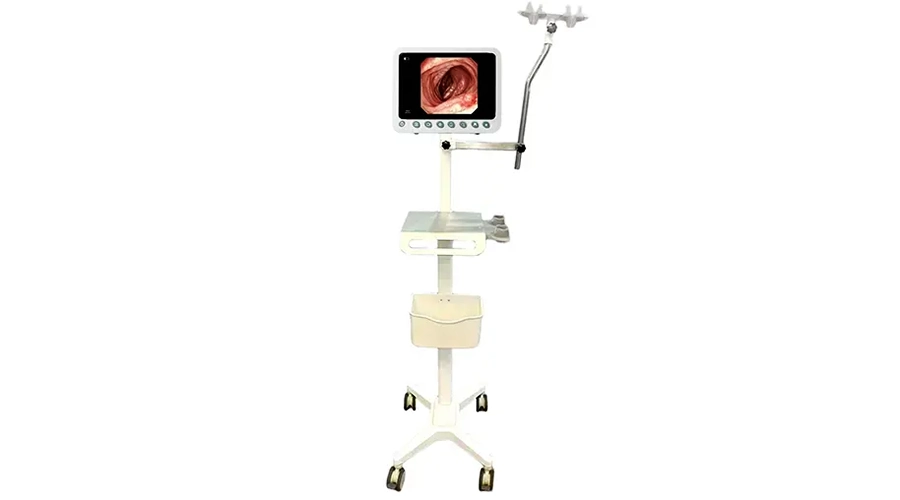
Cart-mountable
4 mounting holes on rear panel for secure cart installation
Clinical Application Matrix
| Anatomical Site | Diagnostic Use | Therapeutic Use |
|---|---|---|
| Nose | Sinusitis classification, polyp assessment | FESS sinus opening, nasal septum shaping |
| Larynx | Vocal cord paralysis, OSAHS positioning | Adenoidectomy, laser tumor removal |
| Ear | Tympanic perforation, cholesteatoma screening | Tympanoplasty, ossicular implantation |
| Head & Neck | Hypopharyngeal cancer staging, thyroid nodule biopsy | Pyriform fistula removal, cyst excision |
Technical Specifications
| Parameter | Details |
|---|---|
| Outer Diameter | 1.9–5.5mm (varies by scope) |
| Working Length | 175mm |
| Viewing Angle | 0°, 30°, 70° |
| Resolution | 4K UHD |
| Navigation | Electromagnetic (0.8mm accuracy) |
| Certification | CE, FDA, ISO13485 |
Comparison with Mainstream Equipment
| Equipment Type | Diameter | Advantages | Example Models |
|---|---|---|---|
| Sinus Endoscope | 2.7–4mm | Full sinus exploration | Storz 4K 3D |
| Electronic Laryngoscope | 3.4–5.5mm | Vocal cord motion analysis | Olympus EVIS X1 |
| Otoscope | 1.9–3mm | Minimally invasive ear surgery | Karl Storz HD |
| Plasma Knife | 3–5mm | Bloodless tonsillectomy | Medtronic Coblator |
Safety and Complication Control
Bleeding Control
Bipolar electrocoagulation (<100℃)
Absorbable hemostatic gauze (48h absorption)
Nerve Protection
Facial nerve monitoring (threshold 0.1mA)
Recurrent laryngeal nerve identification
Infection Prevention
Antibacterial sheath (>99% effective)
Low-temperature plasma sterilization (<60℃)
Cutting-Edge Technological Innovations
AI-Assisted Diagnosis – Detects lesions with 94% accuracy
3D Navigation – Patient-specific 3D printed models
Next-Gen Endoscopes – 4K + fluorescence dual-mode endoscope, magnetic capsule laryngoscope
Robotic Assistance – ENT surgical robots for deep space operations
Material Innovation – Self-cleaning coating, shape-memory alloy guide sheath
Clinical Value and Market Trends
Clinical Advantages
Early laryngeal cancer detection rate improved by 50%
Bleeding volume reduced to <50ml compared to 300ml in traditional surgery
90% voice recovery after vocal cord procedures
Market Insights
Global ENT equipment market size: $1.86 billion (2023)
CAGR: 7.2% (2023–2030)
Future Directions
5G-enabled remote surgical collaboration
Molecular imaging navigation
Wearable laryngeal monitoring devices
Case Study: A 4K nasal endoscope system reduced sinusitis surgery time from 120 minutes to 60 minutes and lowered recurrence rates by 40% (AAO-HNS 2023).
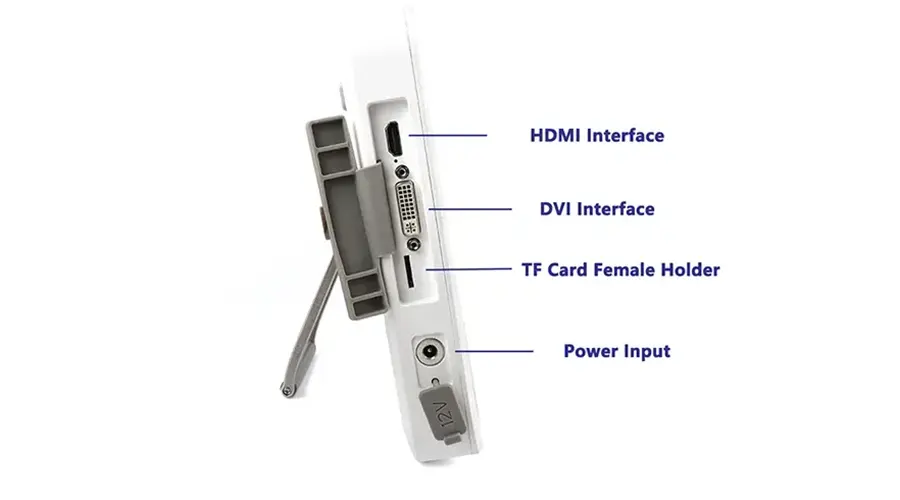
Buying Guide – How to Select the Right ENT Endoscope Equipment
When selecting ENT endoscope equipment, consider the following factors:
Clinical Specialty – Choose sinus, laryngeal, or otologic scopes depending on the case.
Diameter and Viewing Angle – Match scope size to patient anatomy.
System Compatibility – Ensure integration with hospital video and navigation systems.
Certifications – Look for CE, FDA, ISO13485 compliance.
Service & Warranty – Select suppliers with strong after-sales and training support.
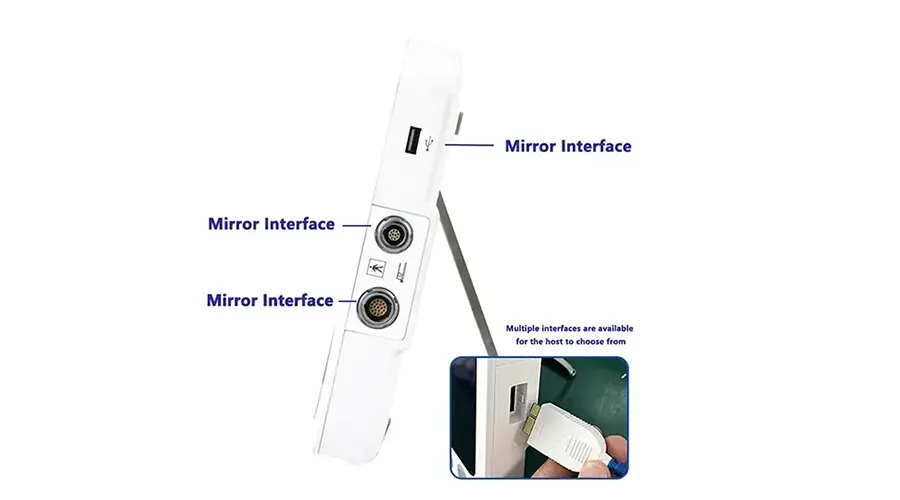
The medical ENT endoscope equipment delivers precision, safety, and innovation for modern otolaryngology. With high-definition imaging, minimally invasive design, and multifunctional treatment modules, it enhances diagnostic accuracy and surgical outcomes. Certified for international standards and supported by cutting-edge technologies, this system offers a reliable solution for hospitals and clinics worldwide.
Faq
-
What is the difference between rigid and flexible ENT endoscope equipment?
Rigid scopes provide higher resolution and stability for surgery, while flexible scopes offer greater maneuverability for diagnosis.
-
How should ENT endoscopes be sterilized?
Most models support autoclave sterilization or low-temperature plasma sterilization, depending on the material.
-
What accessories are required?
Standard accessories include a light source, camera system, monitor, and recording device.
-
What is the average cost of ENT endoscope equipment?
Depending on configuration, costs range from $5,000 to $30,000.
-
Can ENT endoscope equipment integrate with AI diagnosis?
Yes, advanced models support AI lesion detection and image enhancement.
Latest articles
-
How XBX Cystoscope Supplier Ensures Quality and Precision for Hospital Procurement
Discover how the XBX Cystoscope Supplier provides hospitals with high-precision, OEM-ready endoscopy systems built for reliability, safety, and consistent imagi...
-
How XBX Bronchoscope Factory Delivers Reliable OEM Systems
Discover how the XBX Bronchoscope Factory ensures quality and reliability through advanced OEM manufacturing, optical precision, and strict quality control.
-
How XBX Laparoscope Minimizes Surgical Trauma in Abdominal Surgery
Discover how the XBX Laparoscope reduces surgical trauma through precision imaging, minimal incisions, and faster recovery in modern abdominal procedures.
-
How XBX Hysteroscope Detects and Removes Uterine Polyps
Discover how the XBX Hysteroscope enables precise detection and removal of uterine polyps, improving accuracy, safety, and comfort in women’s health care.
-
What Is an XBX Flexible Ureteroscope for Stone Removal?
Learn how the XBX flexible ureteroscope improves access, visibility, and efficiency in ureteral stone management with 4K imaging and ergonomic control.
Recommended products
-
Portable Hysteroscope Machine
The Portable Hysteroscope Machine (Portable Tablet Endoscope Host) delivers HD imaging and portability for hysteroscopy ...
-
4K Medical Endoscope Host
4K Medical Endoscope Host delivers ultra-HD imaging for medical endoscopes, enhancing diagnostic pre
-
Medical gastroscopy equipment
Medical gastroscopy equipment provides HD imaging for endoscopy medical endoscopes, enhancing diagno
-
Medical laryngoscope equipment
Comprehensive introduction to laryngoscope equipmentAs the core tool for upper respiratory tract dia

